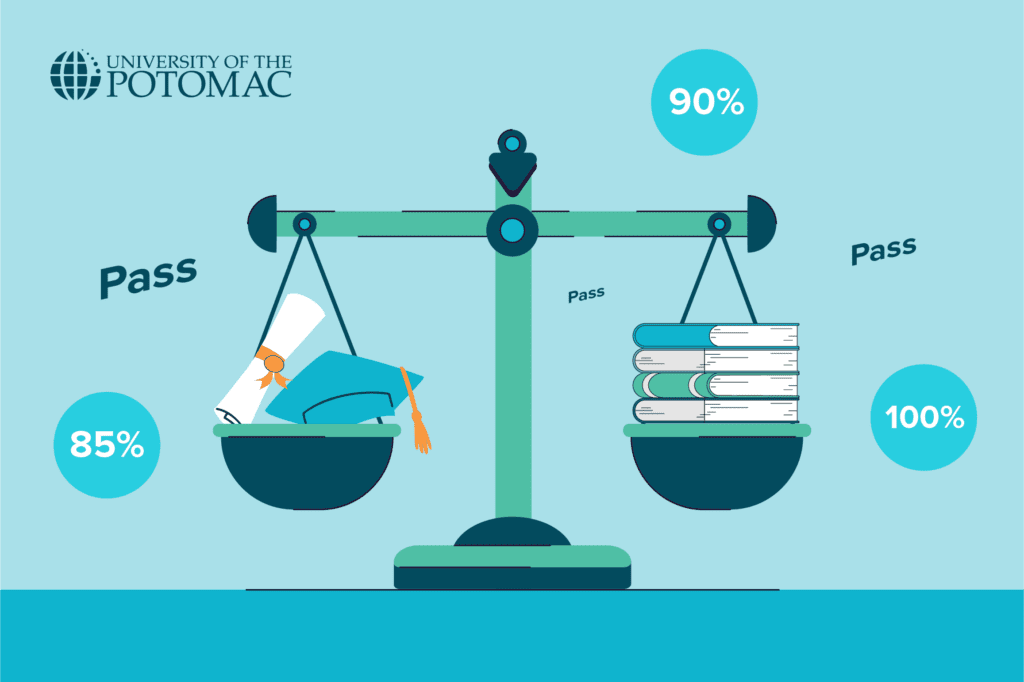From the moment you step onto campus, as a first-year student or a senior, you must be mindful of the number of classes you enroll in, the credit hours those classes offer, and how these accumulate toward your final graduation requirements. Because every class you take in college is like a building block, carefully constructed to help you reach the ultimate goal of graduation.
Keeping track of these details can appear daunting, but they are crucial for ensuring that you meet all the academic criteria set by your institution. So, how many credits to graduate college? Let’s start by clarifying what college credits entail and then explore credit requirements at different degree levels.
What Are College Credits?
Credit hours represent the numeric academic value assigned to a particular course, providing a means to assess the relative difficulty and time commitment associated with different classes. Typically, one credit hour equates to one hour of traditional class instruction per week over a semester. However, this measure extends beyond classroom hours to include additional time required for readings, assignments such as research papers, and studying. For instance, a standard three-credit-hour course generally demands three hours of weekly in-class attendance, complemented by extra hours of independent study. In essence, credit hours reflect the academic workload and depth of learning expected from a course.
Credits help quantify the amount of time and effort students are expected to invest in their coursework, ensuring consistency in academic expectations across institutions. This way, college credits are crucial for tracking progress toward degree completion.
Institutions are permitted to consider various delivery methods, academic calendars, measurements of student work, disciplines, and degree levels when determining the work associated with a credit hour. They must equate their learning experiences with semester or quarter credit hours using practices standard to higher education institutions, justify program lengths compared to similar accredited programs, and justify program-specific tuition in terms of costs, length, and objectives.
How Many Credits Do You Need for an Associate Degree?
The typical credit requirements for earning an associate degree involve completing around 60 credits. This requirement can vary slightly depending on the institution and specific program.
For full-time students, the typical commitment is 12-15 credit hours per semester, enabling them to complete their degree in about two to two and a half years. On the other hand, part-time students who take fewer than 12 credit hours per semester can expect their studies to extend to 48 months or more, providing a more flexible study option.
An associate degree program typically includes a mix of general education, major-specific, and elective courses. General education courses usually amount to about 20-30 credits, major-specific courses often require around 20-25 credits, whereas elective courses typically comprise the remaining 10-15 credits. This balanced distribution ensures students receive a well-rounded education while gaining specialized knowledge in their chosen area.
How Many Credits Do You Need for a Bachelor’s Degree?

Bachelor’s degrees typically require the completion of around 120 credits. These credits are also divided among core or general education courses, major-specific courses, and electives.
Core credit requirements
A bachelor’s degree program’s core or general education requirements provide students with a broad educational foundation. These courses ensure that students develop essential skills and a well-rounded knowledge base, critical for personal and professional success.
Typically, fulfilling these requirements involves completing around 30-40 credits. Common core courses span various academic fields, including English composition, mathematics, natural sciences, social sciences, and humanities. For example, students might take literature, biology, psychology, and history classes. These courses help develop critical thinking, communication, analytical, and quantitative skills, which are fundamental regardless of a student’s major.
Major credit requirements
Major-specific coursework is crucial for gaining in-depth knowledge and expertise in a chosen field. This component of a bachelor’s degree usually requires 40-60 credits, depending on the program and institution. Major courses focus on specialized topics and advanced concepts relevant to the field, preparing students for careers or further academic pursuits.
Within these credit requirements, students can often choose from various electives or concentrations that allow specialization. For example, a business major might focus on finance, marketing, or management, tailoring their education to specific career goals. This structured yet flexible approach ensures comprehensive understanding while enabling students to pursue their unique interests within the discipline.
Elective requirements
Elective courses play a significant role in a bachelor’s degree program by offering students opportunities to explore diverse subjects, develop additional skills, and engage in interdisciplinary studies. Typically, elective courses account for around 20-30 credits. Students can choose electives that align with their academic and career interests, or they might select courses that allow them to explore new areas of curiosity.
Strategically selecting electives can enhance students’ skill sets, making them more versatile and competitive in the job market. For instance, a computer science student might take graphic design or business administration electives to broaden their expertise and career options.
How Many Credits Do You Need for a Master’s Degree?
To graduate college with a master’s degree, students typically need to complete between 30 and 60 credits, depending on the program’s length, intensity, and area of specialization. These credits are distributed among core courses that provide foundational knowledge, specialized electives that allow for deeper exploration within the field, and a capstone project or thesis demonstrating mastery of the subject matter.
The exact number of credits to graduate college varies significantly by institution and academic discipline. For instance, most master’s degree programs at Potomac require around 36 total credits. These programs are designed to be intensive yet manageable, allowing students to gain advanced expertise within a relatively short time frame. On the other hand, some programs at other institutions might demand a higher credit load, reflecting the curriculum’s extensive nature and the specific requirements of the field.
Interested in pursuing a degree?
Fill out the form and get all admission information you need regarding your chosen program.
This will only take a moment.
Message Received!
Thank you for reaching out to us. We will review your message and get right back to you within 24 hours.
If there is an urgent matter and you need to speak to someone immediately you can call at the following phone number:
- We value your privacy.
The variation in credit requirements also depends on the specific focus and structure of the master’s program. For example, professional degrees like a Master of Business Administration (MBA) or a Master of Public Health (MPH) often require a mix of theoretical and practical coursework, possibly extending the credit requirements. Similarly, research-intensive programs, such as a Master of Science (MS) in a technical field, might require additional credits for lab work, research projects, or comprehensive exams.
Understanding these credit requirements is crucial for prospective students planning their educational journey. It ensures they can meet all academic obligations within their desired timeframe, balancing coursework with personal and professional commitments. Additionally, being aware of the specific credit structure helps students make informed decisions about their course load each semester, optimizing their study plans to meet graduation requirements efficiently.
Factors Affecting Credit Requirements
Several factors can influence the credit requirements for earning a college degree. Firstly, transfer credits from previous institutions can reduce the total number of credits needed when applicable. Additionally, prior learning assessments can award credits for relevant work experience, military service, or other non-traditional learning, decreasing credit requirements.
Next, accelerated programs, designed to be completed in a shorter time frame, often have different credit structures, requiring intensive study or condensed coursework. Furthermore, academic policies, including those related to credit limits per semester and residency requirements, also play a significant role in determining how many credits a student needs to graduate. These elements combined create a flexible and individualized pathway toward degree completion.
Academic advising is often needed for students to navigate these factors. Advisors assist students in understanding program structure and making informed decisions about course selection, transfer credits, and the optimal pace for completing their degree. They ensure students meet all academic requirements while aligning their coursework with career and personal goals.
Wrapping Up
Understanding the importance of college credits and knowing exactly how many credits you need to graduate is essential. Imagine a scenario where a student, due to misinformation or lack of knowledge, discovers in their final semester that they are short of the required credits to graduate. This oversight could delay their graduation, disrupt their career plans, and incur additional costs.
Therefore, being informed about your credit requirements is crucial, and this knowledge varies significantly depending on the program and school you attend. It is always best to consult academic advisors regularly to ensure you are on the right track.
At Potomac, we prioritize helping you navigate your college credit hours effectively, guiding you toward earning your degree without unnecessary setbacks. Join Potomac today and take the first step toward a well-structured and successful academic journey.
Frequently Asked Questions (FAQs)
Can you transfer credits into a degree program?
Yes. Many institutions accept transfer credits from other accredited colleges, which can reduce the total number of credits needed to complete your degree.
How many credit hours are required for a bachelor’s degree?
Typically, a bachelor’s degree requires around 120 credit hours.
Can you graduate with less than 120 credits?
Generally, no. But, it might be possible for certain programs, depending on the institution. So, it’s best to contact an advisor.
What do I do if I have a lot of college credits but no degree?
You should consult an academic advisor to evaluate your credits and determine the best path to complete your degree, possibly through transferring credits or enrolling in a degree completion program.










